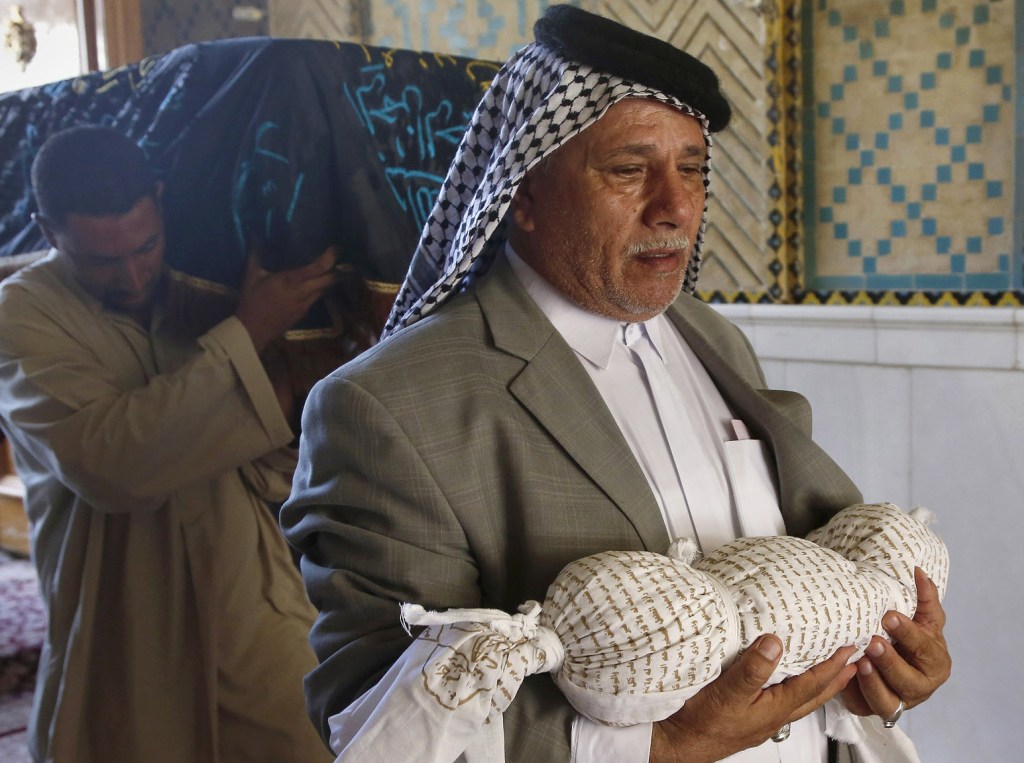BAGHDAD — An Iraqi sheik cradled his grandson’s tightly wrapped body Tuesday, his face grim and his eyes downcast, trailed by men bearing the coffin of the infant’s mother.
The mother and son were killed the day before by a bombing in Baghdad – two among nearly 1,000 Iraqi lives lost to violence in September. The heartbreaking image, captured in an Associated Press photo, illuminates the human tragedy behind the numbers.
Sectarian bloodshed has surged to levels not seen in Iraq since 2008. More than 5,000 people have been killed since April, when a deadly government raid on a Sunni protest camp unleashed a new round of violence that showed al-Qaida in Iraq is still strong despite years of U.S.-Iraqi offensives against the group.
At least 979 people – 887 civilians and 92 soldiers and national policemen – were killed in September, a 22 percent increase from the previous month, the U.N. mission in Iraq said Tuesday. Baghdad was hit hardest, with 418 violent deaths. The U.N. also reported that 2,133 people were wounded nationwide in the relentless car bombings, suicide attacks and shootings.
The spike reversed a brief decline to 804 in August after the death toll reached 1,057 in July, the highest since June 2008 when 975 people were killed.
By comparison, 3,718 civilians were killed in December 2006, the deadliest month of the war, according to a U.S. military tally.
An influx of U.S. troops, a Shiite militia cease-fire and a Sunni revolt against the extremists among them combined to stop the country’s slide toward civil war in 2008.
Al-Qaida in Iraq has claimed responsibility for much of the violence, including a string of car bombings that targeted mostly Shiite neighborhoods in Baghdad on Monday, killing 55 people.
Sheik Mahmoud Abdel Rahman’s 11-month-old grandson, Latif, and the child’s mother, Hasnah Abdel Rasul, were among them. The infant was wrapped in a shroud with verses from the Quran as Abdel Rahman carried it in a procession to bury his two loved ones in the Shiite holy city of Najaf.
The al-Qaida umbrella group Islamic State of Iraq and the Levant said Monday’s attacks were in retaliation for the “arrests, torturing and targeting of Sunnis” by the Shiite-led government. It vowed more attacks.
Copy the Story LinkSend questions/comments to the editors.



Success. Please wait for the page to reload. If the page does not reload within 5 seconds, please refresh the page.
Enter your email and password to access comments.
Hi, to comment on stories you must . This profile is in addition to your subscription and website login.
Already have a commenting profile? .
Invalid username/password.
Please check your email to confirm and complete your registration.
Only subscribers are eligible to post comments. Please subscribe or login first for digital access. Here’s why.
Use the form below to reset your password. When you've submitted your account email, we will send an email with a reset code.